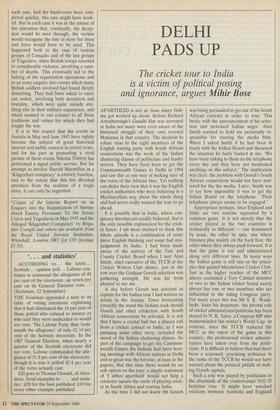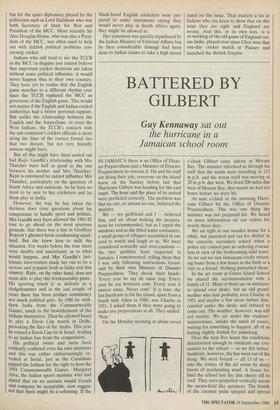DELHI PADS UP
The cricket tour to India is a victim of political posing
and ignorance, argues Mihir Bose APARTHEID is not an issue many Indi- ans got worked up about. Before Richard Attenborough's Gandhi film was screened in India not many were even aware of the historical struggle of their own revered Mahatma in that country. The decision to refuse visas to the eight members of the English touring party with South African connections was the work of the Indian chattering classes of politicians and leader writers. They have been keen to get the Commonwealth, Games to Delhi in 1994 and saw this as one way of making sure of the votes of the African bloc. Yet nothing can shake their view that it was the English cricket authorities who were behaving in a Machiavellian way about the whole thing and had never really wanted the tour to go ahead.
It is possible that in India, where con- spiracy theories are readily believed, that is the only possible explanation for the crick- et fiasco. I am more inclined to think this whole episode is a combination of some naïve English thinking and some bad mis- judgments by India. I had been made aware of the naivety of the Test and County Cricket Board when I met Alan Smith, chief executive of the TCCB at the Cricket Writers Club dinner, just as the row over the Graham Gooch selection was gathering strength. He was far from pleased to see me.
A day before Gooch was selected as captain for the Indian tour I had written an article in the Sunday Times forecasting correctly the stand the Indians took should Gooch and other cricketers with South African connections be selected. It is not that I have a crystal ball but a chance call from a cricket contact in India, as I was pursuing some other story, revealed the mood of the Indian chattering classes. As part of the campaign to get the Common- wealth Games the Indians had been host- ing meetings with African nations in Delhi and so great was the fervour, at least in the papers, that this time there would be no soft option on the tour: a simple statement of 'I abhor apartheid' would not help a cricketer square the circle of playing crick- et in South Africa and touring India.
At the time I did not know tht Gooch was being persuaded to get out of his South African contract in order to tour. This broke with the announcement of his selec- tion and increased Indian anger. Alan Smith seemed to hold me personally re- sponsible for starting the media blitz. When I asked Smith if he had been in touch with the Indian Board and discussed the situation he fairly barked at me, 'We have been talking to them on the telephone every day and they have not mentioned anything on this subject.' The implication was clear: the problem with Gooch's South African connections 'would not have mat- tered for the the media. Later, Smith was to say how impossible it was to get the Indian Board on the telephone. 'Their telephone always seems to be engaged.'
Appropriate perhaps, since England and India are two nations separated by a common game. It is not merely that the cricket played in the two countries is technically so different — one dominated by seam, the other by spin, one where batsmen play mainly on the back foot, the other where they always push forward. It is that the game is run and administered along very different lines. In many ways the Indian game is still run on the princi- ples that guided Marylebone Cricket Club. Just as the higher reaches of the MCC always contained a Tory Cabinet minister or two so the Indian cricket board nearly always has one or two members who are influential in the ruling Congress party. For many years this was Mr S. K. Wank- hede. Since his departure, the pivotal role of cricket administrator/politician has been played by N. K. Salve, a Congress MP who masterminded last winter's World Cup. In contrast, since the TCCB replaced the MCC as the rulers of the game in this country, the professional cricket adminis- trators have taken over from the politi- cians. It is difficult to believe that had there been a seasoned, practising politician in the ranks of the TCCB he would not have warned about the political pitfalls of mak- ing Gooch captain.
Such a role was played by politicians in the aftermath of the controversial 1932-33 bodyline tour. It might have wrecked relations between Australia and England but for the quiet diplomacy played by the politicians such as Lord Hailsham who was both Secretary of State for War and President of the MCC. More recently Sir Alec Douglas-Home, who was also a Presi- dent of the MCC, was often used to help out with ticklish political problems con- cerning cricket.
Indians who still tend to see the TCCB as the MCC in disguise just cannot believe that important cricket decisions are taken without some political influence: it would never happen thus in their own country. They have yet to realise that the English game marches to a different rhythm ever since the TCCB replaced the MCC as governors of the English game. This would not matter if the English and Indian cricket authorities had a better personal rapport. But unlike the relationship between the English and the Australians, or even the West Indians, the TCCB's contacts with the sub-continent's cricket officials is more along the lines of the correct formal ties that two distant, but not very friendly nations might have.
But all this might have been sorted out had Rajiv Gandhi's relationship with Mrs Thatcher been half as good as the one between his mother and Mrs Thatcher. Rajiv is convinced he cannot influence Mrs Thatcher, particularly on the question of South Africa and sanctions. So he feels no need to be nice to her cricketers and let them play in India.
However, the way he has taken the decision does raise questions about his competence to handle sport and politics. Mrs Gandhi may have allowed the 1981-82 tour to go ahead on the most spurious grounds: that there was a line in Geoffrey Boycott's ghosted book condemning apart- heid. But she knew how• to milk the situation. For weeki before the tour there were doubts and uncertainty as to what would happen, and Mrs Gandhi's last- minute intervention made her out to be a saviour and popular tooth in India and this country. Rajiv, on the other hand, does not seem able to play this brinkmanship game. His sporting touch is as delicate as a sledgehammer and in the last couple of years there has been neither consistency nor much political gain. In 1986 he with- drew India from the Commonwealth Games, much to the bewilderment of the Indians themselves. Then he allowed Israel to play a Davis Cup match in Delhi, provoking the fury of the Arabs. This year he vetoed a Davis Cup tie in Israel, leading to an Indian ban from the competition.
His political twists and turns have evidently confused even his own ministers and this was rather embarrassingly re- vealed at Seoul, just as the Canadians Pipped the Indians for the right to host the 1994 Commonwealth Games. Margaret Alva, the Indian sports minister who had stated that on no account would Gooch and company be acceptable, now sugges- ted that there might be a softening. If the black-listed English cricketers were pre- pared to make statements saying they would never play in South Africa again, they might be allowed in.
Her statement was quickly repudiated by the Indian Ministry of External Affairs but by then considerable damage had been done to Indian claims to take a high moral stand on this issue. That matters a lot to Indians who are keen to show that on this issue they are right and England are wrong. And this, in its own way, is a re-working of the old game of England ver- sus India, played ever since Clive won that one-day cricket match at Plassey and launched the British Empire.































































 Previous page
Previous page